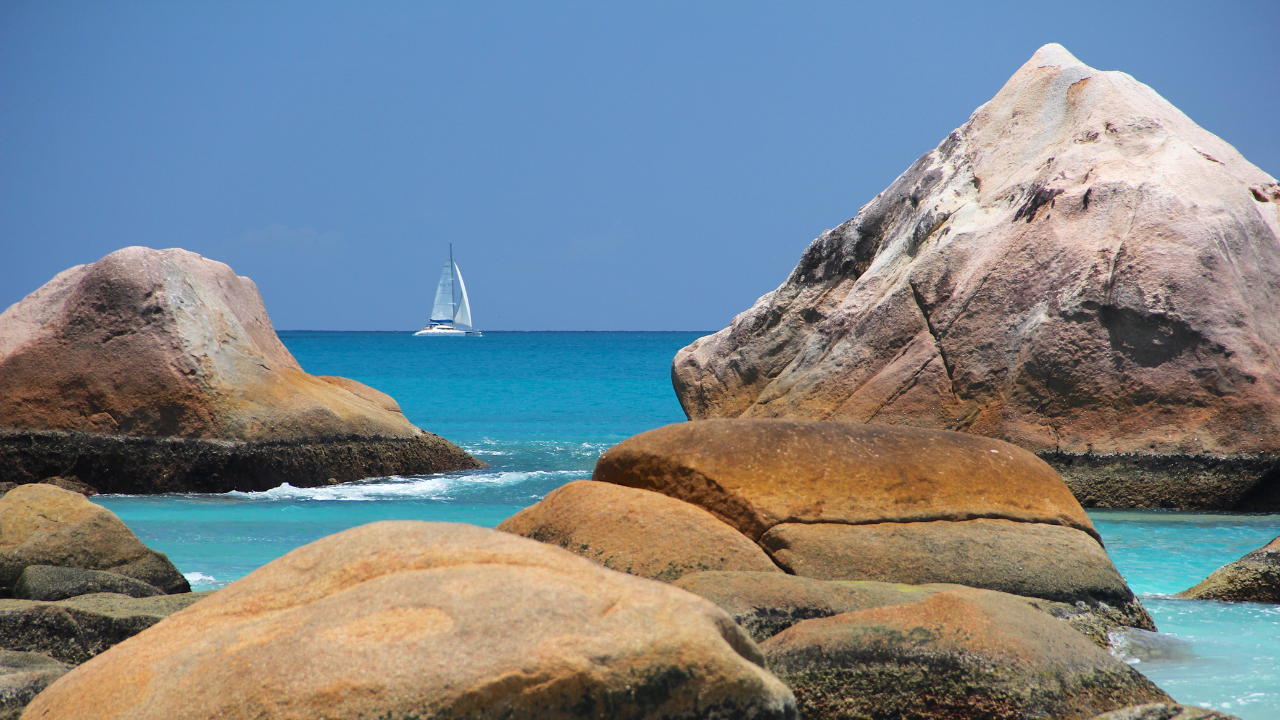Seychelles

Brief information
General Information
Codes
Statistics
Politics
Travel
Language
About Seychelles
A Pristine Island Nation of Tropical Beauty, Strategic Importance, and Cultural Diversity
📍 Geographic Location
Seychelles is an enchanting archipelago of 115 islands nestled in the Indian Ocean, off the eastern coast of Africa and northeast of Madagascar. Known for its breathtaking beaches, lush rainforests, and crystal-clear turquoise waters, Seychelles is geographically isolated yet globally admired for its ecological richness and biodiversity. The majority of the population resides on the largest and most developed island, Mahé, home to the capital city, Victoria.
🏛️ Historical Background
Though uninhabited for centuries, Seychelles became known to European explorers in the 16th century. It was first colonized by the French in the 18th century and later came under British rule after the Napoleonic Wars. The islands gained independence from the United Kingdom in 1976, forming a republic within the Commonwealth. Since then, Seychelles has evolved into a politically stable democracy, navigating its post-colonial era with a focus on environmental sustainability and tourism-led development.
🌍 Global Significance
Despite its small size and population, Seychelles holds a notable position on the global stage. It is a leader in marine conservation and environmental diplomacy, having pioneered innovative financial models like “debt-for-nature” swaps to protect its oceans. As a member of the African Union and other international forums, Seychelles champions the interests of small island developing states (SIDS) in climate change discussions. Its thriving tourism industry, pristine ecosystems, and high Human Development Index (HDI) make it a model for balancing economic growth with ecological preservation.
Interesting facts
Unveiling the Hidden Gems of an Island Paradise
Seychelles may be small in size, but it boasts a fascinating array of geographical wonders, political nuances, cultural richness, and societal uniqueness. Here are 25 lesser-known yet remarkable facts about this idyllic archipelago.
🌍 Geography & Environment
1. Seychelles Has the World's Oldest Ocean Islands
The granitic islands of Seychelles are over 750 million years old, making them among the oldest oceanic islands on Earth.
2. Home to the World’s Largest Seed: Coco de Mer
Native only to Seychelles, the coco de mer palm produces seeds that weigh up to 30 kg and resemble a double coconut.
3. The Country Has No Rivers or Lakes
Due to the mountainous terrain and granite-based islands, Seychelles lacks permanent rivers and inland bodies of freshwater.
4. Aldabra Atoll Is One of the Largest Coral Atolls in the World
This UNESCO World Heritage Site is home to over 100,000 giant tortoises, more than the entire population of Seychelles.
5. Some Islands Are Made of Coral, Others of Granite
While most oceanic islands are volcanic or coral-based, Seychelles uniquely features both coral and granite islands.
🏛️ Politics & Governance
6. Seychelles Is the Least Populous Sovereign Nation in Africa
With just under 100,000 people, it maintains a fully functional democratic system and political institutions.
7. It Was One of the First Countries to Appoint a Female President in Africa
Wavel Ramkalawan became president in 2020, and Seychelles has consistently promoted women in leadership roles, including the judiciary and cabinet.
8. The Country Practices a Hybrid Legal System
Seychelles combines French civil law with English common law—reflecting its colonial past under both nations.
9. Seychelles Has No Standing Army
Instead, it maintains a small defense force and relies on international cooperation for national security.
10. The President Is Also the Head of Government
Seychelles practices a unitary presidential republic system, centralizing executive power.
🎭 Culture & Traditions
11. Seychellois Creole (Seselwa) Is a Fully Recognized National Language
Alongside English and French, Seselwa represents the fusion of African, French, and Malagasy influences.
12. Moutya Dance Was Recognized by UNESCO
This traditional dance, rooted in African slave heritage, was inscribed on the Intangible Cultural Heritage List in 2021.
13. Seychellois Cuisine Is a Fusion of Indian, African, Chinese, and European Influences
It features exotic spices, seafood, tropical fruits, and coconut in everyday dishes.
14. The National Dress Is Rarely Worn Daily
Traditional clothing is reserved for cultural events and festivals, showing a blend of French and African aesthetics.
15. Oral Storytelling Is Still a Common Cultural Practice
Folktales are used to teach moral lessons and preserve historical narratives.
👥 Society & Lifestyle
16. Seychelles Has One of Africa’s Highest Literacy Rates
Literacy stands at over 95%, with free primary and secondary education for all citizens.
17. It Has a Strong Emphasis on Environmental Education
Children are taught sustainability and conservation practices as part of their core curriculum.
18. The Country Has a Matrilineal Social Structure in Many Families
Women often manage finances and property, a legacy of both African and Creole traditions.
19. Despite Tourism, Seychellois Society Is Close-Knit and Community-Oriented
Family gatherings, church activities, and neighborhood connections remain central to daily life.
20. Catholicism Is the Dominant Religion, but Other Faiths Are Tolerated and Practiced Freely
Hindu temples and mosques can also be found, especially in Mahé.
🌐 Global Influence & Innovation
21. Seychelles Is a Pioneer of the “Blue Economy” Concept
It promotes sustainable marine industries like eco-fishing, marine tourism, and ocean conservation.
22. It Conducted One of the First “Debt-for-Nature” Swaps
Seychelles restructured its national debt in exchange for marine protection agreements—a model for other island states.
23. The Country Uses Biometric E-Passports
Seychelles was one of the early adopters of biometric technology in Africa.
24. It’s One of the Few Carbon-Neutral Nations
With abundant solar energy and vast marine forests, Seychelles has committed to climate neutrality.
25. Hosting the World’s Smallest Capital City—Victoria
Despite its size, Victoria features a replica of London’s Big Ben and is a hub for culture and commerce.